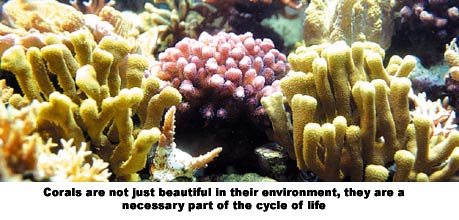
 <Back
<Back
Sow the Seeds of Love![]()
![]()
![]()
This web site is designed for viewing on an 800 x 600 monitor or larger on full screen

24 May 1994
12 Sep 02
Reefballs ~ What Clubs can do ~ Corals

Committee Chairman
Rtn Mike
Alden
Members: President
Rasamalar, PP Rema Paul, PP Jali Kaur, Rtn Seshadari![]()
PROJECT OUTLINE
RC Brickfields has undertaken to make and lay some reefballs in the area of Port Dickson to enhance the marine environment for fish and to create a healthy environment for them to spawn. Reefballs are a well known and understood technique for helping the marine environment and more details of Reefballs can be found below.
The majority of the information found has been on coral reefs, where reefballs are also used to repair reefs, form new reefs and assist in reef extension. Little has been found on the use of reefballs for helping fish, and therefore much of these pages are devoted to the coral environment. The general theories, though, apply as much to the fish and their environment as to coral, since the coral reefs are major spawning grounds. We will extend these pages as more information is found that is fish based.
RC Brickfields, in cooperation, with Reefballs Asia Sdn Bhd and the Taman Desa Interactors Club (to be confirmed), will construct up to 12 reefballs in Port Dickson during the weekend of 26/27 October 2002. The reefballs will be left to cure for at least a month and they will then be submerged in the seas off Port Dickson at a place to be advised by the Fisheries Department in conjunction with Reefballs Asia Sdn Bhd. The outline programme is as follows:
| Time | Event |
| 26 Oct 02 | |
| 12:30 | Arrival and informal lunch - displays for visitors to look at |
| 2:00 pm | Multi Media Presentation by RC Brickfields and Reefball Asia Sdn Bhd |
| 2:30 pm |
Building reefballs |
| 7:30 pm | Fellowship |
| 27 Oct 02 | |
| 10:00 am | Construction of extra balls if required |
Accommodation will be arranged for those who want it - details to follow.
Members of other Rotary Clubs are welcome to join us for the weekend. Accommodation, meals and beverages are to be paid as used for consumed. If you are interested in joining us for the project please e-mail us by clicking here.
Further details will be posted on this page as they become available.
Although man is a comparatively infrequent visitor to the oceans he has, nevertheless, badly damaged them. Oceanic noise pollution from the sound of propellers and other man made devices is reducing the range of the mating call of the whale - and thus endangering the species. Over-fishing is badly depleting the ocean's stock, whilst anchoring, cyanide and dynamite fishing, coastal urban and industrial development, marine tourism is ruining our coastlines. Among the casualties in this ecological war is coral. It is believed that 80% of existing coral reefs are under threat from human sources, and some of those reefs can never recover. Even the Great Barrier Reef is a casualty, even though only comparatively slightly damaged, but that is a reef that is hgh on the conservationist's lists. You can learn more about coral by clicking here. Click here to see a New Straits Times article with colour pictures.
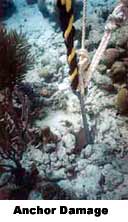 But coral reefs are far from the only elements of the sea
that is damaged. Our coastlines are being destroyed by man's activity on
land, with effluence and chemicals sometimes piped raw to disperse in the
sea. This not only kills or damages the marine life, it has a lasting
effect on the the life cycle of our underwater creatuers, thus further
depleting the fish stock, already much depleted by over fishing.
But coral reefs are far from the only elements of the sea
that is damaged. Our coastlines are being destroyed by man's activity on
land, with effluence and chemicals sometimes piped raw to disperse in the
sea. This not only kills or damages the marine life, it has a lasting
effect on the the life cycle of our underwater creatuers, thus further
depleting the fish stock, already much depleted by over fishing.
Man's depredation of the sea is not widely understood, nor is it even publicized very much. Of course, we do hear of the major disasters caused by the oil tankers.We hear about the damage to our normal environment, the land, because we live there. But the sea is not our natural environment and so we do not see the daily disasters that affect marine life. It is unseen, and therefore, often unknown. Man needs to better understand the sea and it's place in the ecology of our planet. It is one of the major driving forces, for instance, of the weather. It is also a major source of oxygen, so vital to our well being. For this reason it is well worth protecting before it is too late.
It was with this in mind that the Rotary Club of Brickfields embarked on a new project to protect our Malaysian shores in conjunction with an environmental company, Reeefball Asia Sdn Bhd. After much consideration and discussion we decided that we would best be able to serve the marine ecology by taking on the basic task of providing a safe place for fish to spawn and grow. It is clear that such areas are getting fewer and fewer. It is also well within our ability to take on, and hopefully to expand it to a wider audience within Rotary.
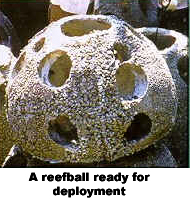 What, one may well ask, is this thing o the
right?
What, one may well ask, is this thing o the
right?
It is a Reefball! And what is a Reefball? You are about to find out!
One evening this year (2002) we had a most interesting speaker, Lawrence Cardosa of Reefballs Asia Sdn Bhd, who spoke on the subject of Reefballs. This is a concept that has been established for some time to preserve the habitat of, among other things, coral. But first, a little background.
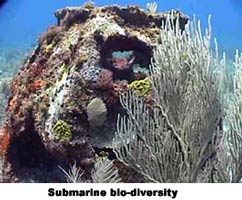 It is well known that coral reefs are under threat throughout the world.
Indeed, the author believes that it is as much as 50% of the world's coral
reefs that are threatened, badly damaged, or even beyond redemption. That
is an enormous loss to the planet, and it is something that only real
environmentalists are aware of. Yes, of course, we read about the damage
here and there, but even the most carefully preserved reefs along the
Great Barrier are suffering damage. Untold damage has been created in the
coral reef band of the world, especially in Asia, by the many forms of
fishing, in particular dynamite and cyanide fishing. The sea cannot
sustain this incredible rate of damage much longer as the reefs are the
spawning grounds, breeding grounds and natural habitat of a significant
percentage of marine life - and to lose that is to break the feeding chain
which rolls the damage on through other sea species. And yes, the
extensive damage is badly affecting human fishing endeavors as well.
It is well known that coral reefs are under threat throughout the world.
Indeed, the author believes that it is as much as 50% of the world's coral
reefs that are threatened, badly damaged, or even beyond redemption. That
is an enormous loss to the planet, and it is something that only real
environmentalists are aware of. Yes, of course, we read about the damage
here and there, but even the most carefully preserved reefs along the
Great Barrier are suffering damage. Untold damage has been created in the
coral reef band of the world, especially in Asia, by the many forms of
fishing, in particular dynamite and cyanide fishing. The sea cannot
sustain this incredible rate of damage much longer as the reefs are the
spawning grounds, breeding grounds and natural habitat of a significant
percentage of marine life - and to lose that is to break the feeding chain
which rolls the damage on through other sea species. And yes, the
extensive damage is badly affecting human fishing endeavors as well.
It is strange that those who make a living from the sea are also doing so much to damage their own, once fertile, once abundant fishing grounds, but it is true.
Reefballs are an attempt to preserve some of the coral habitats, and to reestablish damaged ones. The principle is simple. Stunningly simple. A Reefball is simply a specially prepared inert concrete ball, with holes and crevices in it, which make an ideal habitat for coral. It is inert simply to ensure that the concrete does not raise or lower the pH or alkaline levels beyond the acceptable levels for coral. This ball may be as large or small as one likes, but once it is dropped in a suitable place then coral will probably start to grow. And in that simple process a small amount of regeneration of coral has taken place. One small step for coral...
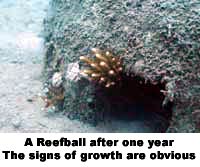 The theory can be taken further. Coral spawns polyps that are taken by the ocean
currents, sometimes far afield. They sink to the ocean bed and start
forming a coral reef, (if successful). However, only 1 in 10,000 of those
polyps survive to grow, and in their turn spawn, so statistics are much
against coral in the first place. Add to that the damage that human endeavor
is doing to their survival and is can readily be appreciated
that coral really is in danger of extinction. So how can we develop the
theory further? Sexual breeding is done polyp by polyp, which grows in the
new area individually. But by taking a small, carefully chosen piece of
living coral with say, 1,000 polyps, and placing that in a new area the
chances of success are immediately improved 1,000 times. And that is what
can be done with Reefballs. Plant a small stick of coral in the reefball
and put that in a new environment and watch the results. After only a few
months regeneration is obvious.
The theory can be taken further. Coral spawns polyps that are taken by the ocean
currents, sometimes far afield. They sink to the ocean bed and start
forming a coral reef, (if successful). However, only 1 in 10,000 of those
polyps survive to grow, and in their turn spawn, so statistics are much
against coral in the first place. Add to that the damage that human endeavor
is doing to their survival and is can readily be appreciated
that coral really is in danger of extinction. So how can we develop the
theory further? Sexual breeding is done polyp by polyp, which grows in the
new area individually. But by taking a small, carefully chosen piece of
living coral with say, 1,000 polyps, and placing that in a new area the
chances of success are immediately improved 1,000 times. And that is what
can be done with Reefballs. Plant a small stick of coral in the reefball
and put that in a new environment and watch the results. After only a few
months regeneration is obvious.
Reefballs can also be used to provide safe habitat for young fish. In the past safe living has been provided by rubber tyres which were attached to the bottom. The internal rims provided and excellent place for fish to thrive and to that extent they were entirely successful. But they do not stay attached to the bottom for ever; eventually the chain or rope wears away in the hostile environment of the sea and the tyre breaks loose and begins to drift. With its just negative buoyancy it tends to sweep along the bottom knocking everything down in its path. Thus the good that it has done is often undone and more. The damage they createt can be so great that there are parts of the world where helicopters are used to search for errant tyres, to prevent further marine damage.
Our Project and what other Rotary Clubs can do.
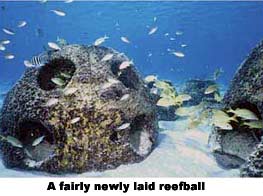 The Rotary Club of Brickfields is now in partnership
with Reefball Asia Sdn Bhd. Our aim is to create a friendly environment
for fish to breed and grow, and to provide that in as many places as we
can in Malaysia. As such we are establishing our own reefball farm in Port
Dickson here we will seed a selected area as advised by the Fisheries
Department through the good offices of Asia Reefball Sdn Bhd. Admiral
Marine & Leisure Club has kindly agreed to let us use their facilities
and have become very much part of the project.
The Rotary Club of Brickfields is now in partnership
with Reefball Asia Sdn Bhd. Our aim is to create a friendly environment
for fish to breed and grow, and to provide that in as many places as we
can in Malaysia. As such we are establishing our own reefball farm in Port
Dickson here we will seed a selected area as advised by the Fisheries
Department through the good offices of Asia Reefball Sdn Bhd. Admiral
Marine & Leisure Club has kindly agreed to let us use their facilities
and have become very much part of the project.
We are seeking full publicity for the making of the reefballs and for their eventual dispersal. We will periodically return to check on the progress and report accordingly.
But we are looking for partners in this project. In this case we are not so much looking for funds, though they will always be welcome. We are hoping that every Malaysian Rotary Club will sponsor their own area of coastline, and so extend the a healthy environment for spawning and young fish far and wide.
For more details please contact Rtn Mike Alden.
![]()
useful links to other pages on this site
More pages will be added in the future, especially on the environment for fish. These pages have been included to give more understanding about the plight of our coral reefs.
The first one is an article based on the Living Islands in the Dutch Caribbean and written by Natourdata of the Netherlands. Click here.
The second one is an article from the New Straits Times in which there is a short survey about Asian reefs and what we can do to preserve them. It also describes a scheme to protect them which has attached the interest of British environmentalist, broadcaster and ecology activist Dr David Bellamy. Click here.
In the meantime here are some links to Reefball web sites which you may like to follow. But remember this, coral is an endangered species and needs our attention.
http://www.artificialreefs.org/
http://www.reefball.com/
http://www.reefballasia.com/
![]()

Rotary International District 3300 Malaysia
Webmaster RtnMikeAlden

